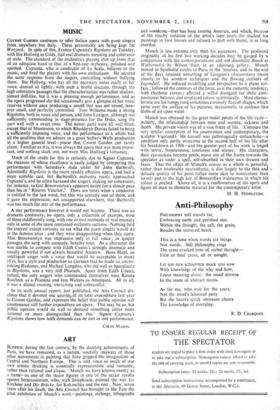MUSIC
CovErrr GAItDEN continues to offer Italian opera with guest singers from anywhere but Italy. These presumably are being kept for Wozzeck. In spite of this, Franco Capuana's Rigoletto on Tuesday, with use Hollweg as Gilda, had real dramatic meaning and coherence of style. The standard of the orchestra's playing shot up from that of an adequate band to that of a first-rate orchestra, polished and spirited. Capuana, who is conductor of La Scala, believes in the music, and fired the players with his own enthusiasm. He secured the same response from the singers, controlling without bullying them. use Hollweg, who has all the necessary notes easily in her voice, danced so lightly, with such a brittle staccato, through the high coloratura passages that the characterisation was rather shallow, almost doll-like, but it was a pleasing enough performance, and as the opera progressed she did occasionally give a glimpse of her vocal reserves without once producing a sounli that was not round, how- ever small, and perfectly controlled. Tom Williams made a strong Rigoletto, both in voice and person, and John Lanigan, although not sufficiently commanding in stage-presence for the Duke, sang the part well with a sweet tone. The minor parts were all well filled, except that of Monterone, to which Rhydderch Davies failed to bring a sufficiently imposing voice, and the perforMance as a whole had all the qualities that we admire in a good Sadler's Wells production at a higher general level—praise that Covent Garden can rarely claim. Familiar as if it was always the opera that was most impor- tant, and nothing stuck out, not even Miss Hollweg's virtuosity.
Much of the credit for this is certainly due to Signor Capuana, the measure of whose excellence is easily judged by comparing this performance with Saturday's Aida under Sir John Barbirolli. Admittedly Rigoletto is,the more readily effective opera, and had a more suitable cast, but Barbirolli's orchestra rarely approached. Capuana's, and he often harassed the singers, making no concession, for instance, to Gre' Brouwenstyn's apparent desire for a slower pace than his in " Ritortta Vincitor." There are times when a conductor is entitled to the last word, but this was scarcely one of them, and it gave the impression, not unsupported elsewhere, that Barbirolli was too much the star of the performance.
A star performance however it would not become. There was no dramatic continuity, no opera, only a collection of excerpts, most of them indifferently sung, with one or two moments of real intensity only in some of the more restrained orchestra sections. Nothing held the interest except curiosity to see what the guest singers would do in the famous arias ; and they were disappointing when they came. Miss Brouwenstyn was impressive only at full voice ; in quieter passages she sang with unsteady, breathy tone. As a character she was unable to compete with Edith Coates's strongly dramatic and vocally powerful if not always beautiful Amneris. Hans Hopf, an intelligent singer with a voice that would be acceptable in many roses, has a style and production so German that he made an uncon- vincing Radames, and Michael Langdon, who did well as Sparafucile in Rigoletto, was a very stiff Pharaoh. Apart from Edith Coates, indeed, the only singers who commended themselves were Rosina Raisbeck as a Priestess and Jess Walters as Amonasro. All in all, it was a dismal evening, unexciting and unbeautiful.
In its sixth annual report, just published, the Arts Council dis- closes that it devoted one quartei, of its total expenditure last year to Covent Garden, and expresses the belief that public opinion will countenance still further expenditure on opera. This may be so, but public -opinion would do well to demand something either more national or more distinguished than this. Signor Capuana's Rigoletto shows how both demands can be met in one performance.
COLIN MASON.


































 Previous page
Previous page